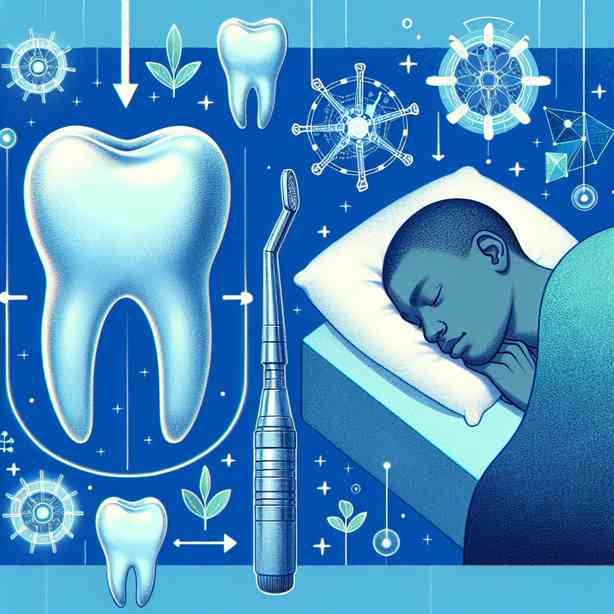
The relationship between oral health and sleep quality is an intriguing area of study that more people should pay attention to. It is often said that a healthy body leads to a healthy mind, and your mouth plays a crucial role in both. While many individuals may not connect their dental health with their sleep patterns, research indicates that there are surprising correlations between the two. This article will delve into how your teeth may impact your sleep, the physiological links between oral health and sleep disorders, and practical tips to maintain both for overall well-being.
To begin with, one of the most common connections between teeth and sleep involves sleep apnea. This disorder is characterized by repeated interruptions in breathing during sleep, leading to fragmented sleep and a host of health problems. Individuals with obstructive sleep apnea (OSA) often experience a narrowing of the airway due to issues related to oral health, such as enlarged tonsils or a receded jaw. Dental structural problems, like misaligned teeth or an improper bite, can exacerbate these issues. As a result, those with these dental conditions are at a higher risk for sleep apnea, which can significantly affect their overall quality of life.
Furthermore, it’s essential to consider that teeth grinding, or bruxism, is another key factor linking dental health and sleep quality. Stress, anxiety, and misalignment of the teeth can lead to bruxism, resulting in nighttime teeth grinding. Individuals may not even realize they are grinding their teeth during sleep until their dentist highlights the signs—such as wear on the teeth or inflammation of the jaw. This habit not only damages the teeth but can lead to sleep disturbances. When the body is under stress, either from physical pain or internal anxiety, it becomes difficult to achieve restful sleep. Therefore, addressing bruxism through dental interventions, such as custom mouthguards, can significantly improve sleep quality.
Additionally, periodontal disease, which affects the gums and bones surrounding the teeth, has shown links to sleep disturbances. Studies have indicated that individuals with moderate to severe gum disease are more likely to experience sleep problems. This correlation might be attributed to inflammation that arises from gum infection, which can signal the body to remain alert during the nighttime. Pain from the gums may also keep individuals awake, leading to disrupted sleep. Maintaining consistent oral health through good oral hygiene practices, routine dental check-ups, and a balanced diet may thus mitigate these risks.
Moreover, oral health issues can influence more than just sleep quality; they can also affect the overall circadian rhythm. The circadian rhythm is the body’s internal clock, which regulates sleep-wake cycles. Chronic pain or discomfort due to oral health issues can disrupt this rhythm, making it challenging to fall asleep or stay asleep. Individuals often experience irritability and fatigue when they do not get enough rest, which can exacerbate stress and lead to further dental issues, creating a cycle that is challenging to break.
On the other hand, understanding the psychological aspect of this relationship is equally important. Poor sleep can lead to increased stress, anxiety, and even depression, which can have a direct impact on one’s motivation for maintaining oral hygiene. Those who are sleep-deprived might neglect their dental care routine, leading to a higher risk of cavities and gum diseases. This cyclical nature highlights the need for a holistic approach to healthcare that prioritizes both mental well-being and physical health.
For those looking to improve their sleep quality through better oral health, there are several actionable steps that can be taken. First, adopting an effective oral hygiene routine—including regular brushing, flossing, and visiting the dentist—will help maintain healthy teeth and gums. Second, maintaining a balanced diet that promotes oral health is vital. Foods rich in calcium and phosphorous, such as dairy, nuts, and leafy greens, can help strengthen teeth. Additionally, limiting sugar intake can reduce the risk of cavities and gum disease, both of which can lead to sleep disturbances.
Third, managing stress is crucial. Engaging in relaxation techniques, such as meditation, yoga, or deep breathing exercises, can help alleviate anxiety that often leads to bruxism and other oral-related sleep disturbances. Creating a sleep-friendly environment—such as keeping the bedroom cool, dark, and quiet, and establishing a bedtime routine—can also promote better sleep quality.
Lastly, for individuals who suffer from significant sleep disturbances related to oral health issues like OSA or severe bruxism, consulting a healthcare professional is essential. Dental professionals can provide tailored solutions, such as mouthguards or other orthodontic treatments, which can address the root causes of these issues. Sleep specialists can assist in diagnosing conditions like sleep apnea and may recommend treatment options ranging from continuous positive airway pressure (CPAP) devices to lifestyle changes aimed at improving both dental and sleep health.
In summary, the surprising link between teeth and sleep is a well-documented relationship that merits further attention. By understanding the connections between oral health and sleep quality, individuals can take proactive steps to improve both. Prioritizing dental care, managing stress, and seeking professional help when necessary can lead to a marked improvement in both sleep patterns and overall health. This holistic approach to well-being underscores the importance of treating the body as an interconnected system. As we continue to learn more about the intricate ties between different aspects of health, one thing remains clear: taking care of your teeth is not only vital for a bright smile but also for achieving restful and rejuvenating sleep.


